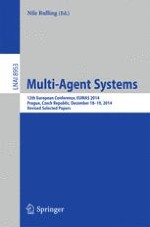2015 | OriginalPaper | Buchkapitel
Synthesis with Rational Environments
verfasst von : Orna Kupferman, Giuseppe Perelli, Moshe Y. Vardi
Erschienen in: Multi-Agent Systems
Aktivieren Sie unsere intelligente Suche, um passende Fachinhalte oder Patente zu finden.
Wählen Sie Textabschnitte aus um mit Künstlicher Intelligenz passenden Patente zu finden. powered by
Markieren Sie Textabschnitte, um KI-gestützt weitere passende Inhalte zu finden. powered by
